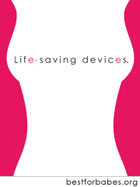A provision in the new health care reform law (The Patient Protection and Affordable Care Act (HR 3590) promises protections to working mothers who choose to breastfeed their infants. Section 4207 amends the Fair Labor Standards Act to require that employers provide reasonable break times for breastfeeding mothers and a place, other than a bathroom, for an employee to express breast milk. While some states, such as California and New York, already have similar laws, the majority of states do not. The provision in the Health Care law is a significant step toward closing the gap between breastfeeding recommendations from health officials and legal protections for working mothers.
The infant and maternal benefits of breastfeeding are well-recognized. A mother’s milk can, for example, reduce an infant’s risk of gastrointestinal, respiratory tract and ear infections, and of sudden-infant death syndrome (SIDS). Mothers who breastfeed also have a reduced risk of developing breast, uterine and ovarian cancers. Ultimately, breastfeeding can mean fewer health care visits and fewer hospitalizations, resulting in lower health care costs. Because of these important benefits, a number of health organizations, including the American Academy of Pediatrics and the American Public Health Association, recommend that infants breastfeed for at least twelve months. Despite these recommendations, the United States has one of the lowest breastfeeding rates in the industrialized world. While 73% of mothers initiate breastfeeding, only 43% continue for six months and only 22% breastfeed for the first full year of their child’s life.
There is no question that breastfeeding is a highly personal decision that can be influenced by a myriad of factors. For many mothers, however, breastfeeding decisions have been dictated by workplace barriers. Inflexible break schedules, inadequate facilities, professional stigma and lack of job security are just some of the job-related reasons why some women never initiate breastfeeding or terminate the process early. Certain workplace challenges (i.e., no private offices or corporate lactation programs) tend to be even greater for low-wage and hourly workers, whom are disproportionally African American and Hispanic.
For years, there has been a glaring disconnect between the national campaign promoting the critical health benefits of breastfeeding and legal protections for working mothers. Just this past August while health professionals were promoting the benefits of breastfeeding during National Breastfeeding Awareness Month, the Ohio Supreme Court held that it is lawful for an employer to fire a woman who takes breaks to express milk. Allen v. Totes/Isotoner Corp. The Plaintiff, LaNisa Allen, nursed her daughter before her 6:00 a.m. shift, but was expected to wait five hours until her 11:00 a.m. lunch break to pump. To prevent mastitis and other infections, women are encouraged to express milk every few hours or as often as their infant nurses. When the company discovered that Allen, an hourly employee, was taking an unauthorized break to pump in the bathroom, she was fired.
Allen sued for wrongful termination, alleging pregnancy discrimination. The trial court found that Allen’s termination was based on failure to follow company policy and not unlawful discrimination. In a decision drawing national attention, the Ohio Supreme Court agreed. After finding that Allen took unauthorized breaks, the Ohio Supreme court declined to rule on whether pregnancy laws cover workplace lactation. The Court held that Allen missed her chance to put that question to the test by taking breaks to pump without permission.
In the absence of legal protection, working mothers, like LaNisa Allen, have had to choose between optimum health benefits for themselves and their infant or their job. For many women, this has meant no choice at all. The protections in the Health Care Reform law will not only help create real choices for working mothers, but they have the potential to help increase both breastfeeding initiation and duration and to decrease disparities in these rates across all populations. Employers also stand to benefit. According to a study by the National Business Group on Health, creating a breastfeeding-friendly work environment decreases employee absenteeism, promotes an earlier return from maternity leave and increases retention of female employees.
The new law will not apply to employers with less than 50 employees if it would impose an “undue hardship.” Additionally, the law designates the required breaks as unpaid, but does not ensure that they will not be treated less favorably than comparable breaks (i.e., smoking breaks). While there is certainly more work to be done, the breastfeeding protections are a significant step toward closing the gap for working mothers.
by Lisa Kathumbi
Lisa Kathumbi is Senior Legal Counsel to the Ohio Department of Health. Prior to joining ODH, Lisa worked at a private law firm representing companies in employment law matters. Lisa has also worked for women’s advocacy organizations in Chicago, Washington, D.C. and Botswana.
Subscribe to:
Post Comments (Atom)





















No comments:
Post a Comment